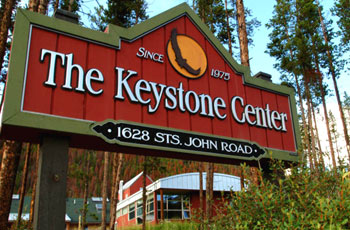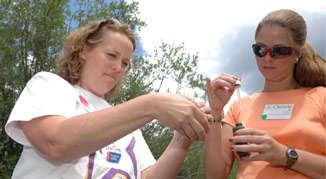About Us
Message from Peter Adler, President,
The Keystone Center,
May 2006
Albert Einstein once said that solving the big problems we now face cannot be done with the same kind of thinking that got us into those problems. By following our timeline, which explores The Keystone Center’s 30-year history, you will see just how right Einstein was. For three decades, The Keystone Center has brought diverse thought leaders to the table to solve stubborn policy issues and, through our sophisticated science education programs for teachers and students, has been steadily preparing the next generation for the same critical thinking that Einstein alluded to.
Robert W. Craig, The Keystone Center’s founder, put it this way, “In general, I believe it can be said that successes in one sector of policy conflict and deliberation led to our being invited into other problem areas. What has and still does distinguish The Keystone Center has been its ability to select and have at the table the best representatives of all parties at interest in a particular issue and to assure that the dialogues that emerge are kept honest by the discipline of the best science and technological knowledge underlying that issue.”
In June 2005, in celebration of our 30th Anniversary, The Keystone Center hosted a symposium in Washington, DC on “Political Courage and Bridge-Building.” Senators Larry Craig (R-Idaho) and Ron Wyden (D-Oregon);Representatives Nancy Johnson (R-Connecticut) and Ed Case (D-Hawaii) joined National Public Radio’s Washington Editor Ron Elving and the Heritage Foundation’s John Hulsman to debate the very themes that TKC has personified for so many years. “Information is what drives people to work together,” said Nancy Johnson. “It is political glue.” To which Senator Wyden added, “Bipartisanship is more alive than we know but less visible than it has ever been. That visibility is crucial if faith in our democracy is to be maintained.”
The Keystone Center has much to be proud of. Today, The Keystone Center has a growing network of colleagues and friends around the world, people who believe as we do that collective wisdom can and must be uncorked to solve problems at the local, national, and global level. As we look ahead, we see a growing list of science-intensive political problems that will command future attention. These include emerging technologies (nanotechnologies, genetically modified organisms, pharmacogenomics), social risk, energy challenges (production, transmission, financing), and food and nutrition (obesity in the developed world, hunger and malnutrition in the developing world), as well as preparing our future leaders for careers in science and technology.
Keep your eye on these and many other issues. As people gather to take them on, The Keystone Center will be there to help convene and broker solutions and prepare the next generation of leaders to think and act in ways that would have made Einstein proud.
-Peter S. Adler, Ph.D
President

|

The Keystone Center seeks to solve our society’s most challenging environmental, energy, and public health problems. We bring together today’s public, private and civic sector leaders to confront these issues and we arm the next generation with the 21st Century intellectual and social skills required to effectively approach the questions they will face. Founded in 1975, the Center is a non-profit organization headquartered in Keystone, Colorado with offices in Denver, Washington, Boston, and Santa Fe.


|



